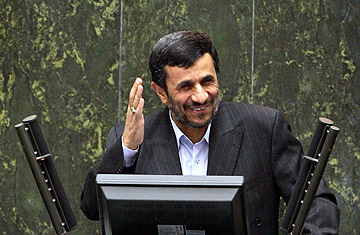
Iranian President Mahmoud Ahmadinejad gestures as he addresses lawmakers during a parliament session in Tehran on November 15, 2009.
If you think Mahmoud Ahmadinejad hasn't been getting much love from the global community over Iran's nuclear ambitions, you should hear what Iran's politicians have been saying.
In late October, Ahmadinejad was sounding pretty confident. He portrayed the International Atomic Energy Agency's proposal for an enrichment of Iran's nuclear fuel outside the country as a win for the Islamic Republic. Furthermore, the Iranian President's rhetoric was unusually conciliatory towards the U.S. and its allies. "Today, the conditions are ripe for nuclear cooperation at international levels," he concluded. The proposed agreement in the Vienna talks, he declared, showed that the country was "moving in the right direction."
Days later, however, came the domestic backlash. Iranian Judiciary Chief Sadeq Larijani told reporters, "sending uranium out of Iran should be pondered upon and it seems that such an interaction on nuclear energy is not beneficial to Iran." His brother, Speaker of the Iranian Parliament Ali Larijani, was also reportedly critical, saying the proposal as it stood was "neither logical nor legal." Parliament members began to publicly bash the Vienna deal. One member stated there is no guarantee in the proposed deal that the West "will fulfill their commitments" in the nuclear talks and that "Iran is right to distrust them." Another member argued that the "media commotion" in the West was wrong in reporting that "Iran has submitted to the idea of ending uranium enrichment." A commentary in the conservative online news site Qods challenged President Ahmadinejad's interpretation of events: "To what extent has each of the two sides, especially Iran, benefited from that 'win-win' game? Has this 'win' been at the level of 50%, or has Iran's share of that win been 10% and the other side's win has been 90%, or vice versa?"
Ahmadinejad was also condemned by the leaders of Iran's opposition Green movement and their allies in the Militant Clergy Society, an important coalition of reformist Iranian politicians, who released a statement on November 4 that read, "we warn against current ploys to empty the [nuclear fuel] reserves obtained and ask relevant authorities to be insistent in defending this evident right."
Was a possible historic deal between Iran and the West over its nuclear program, after three decades of mistrust, being sacrificed at the altar of domestic politics?
Maybe not. Since then, however, the bluster coming from Tehran has faded — and a consensus imposed from above may be forming. Instead of a rejection, Iran seems to be formulating a counter-proposal, one that conservative newspaper Keyhan described as a "gradual and simultaneous" exchange of enriched uranium with the West. Uranium would be sent abroad in two stages, not all at once, and any nuclear material shipped outside of Iran must be simultaneously exchanged for the enriched nuclear fuel Iran needs for domestic use. The worry in Tehran is that, if the original IAEA proposal were agreed to, the Islamic Republic would have to send out its stockpile of uranium before receiving third-party enriched fuel. Therefore, Keyhan wrote, "in view of its historical distrust of the West, a strong guarantee for receiving the fuel for the Tehran reactor needs to be given." Given that the newspaper is a staunch supporter of Iran's Supreme Leader Ayatollah Khamenei, this counter-offer would seem to have the backing of the upper echelon of the Islamic Republic.
Sure enough, the President of Iran re-emerged as optimistic as ever. "We have now entered a stage of cooperation," Ahmadinejad said in a televised interview, and observed that "there is no more talk of suspension" of Iran's nuclear program in the negotiations. According to Keyhan, the ball is now in the U.S.'s court. They quote an "informed source" as saying, "Clearly, the West needs to make an agreement with Iran and we have provided them with the means to save face." The source continued, "From this point onwards, everything depends on how far the West can correctly calculate the benefits of interaction with Iran."
Iran's leaders may be getting their act together, slowly, on the nuclear debate. But they haven't done much work selling the issue to average Iranians, who still worry about daily matters. While overall inflation has decreased to single digit percentages, residents of East Tehran expressed to TIME their concern about rising bread prices and the possible removal of energy subsidies by the government in the coming year. As in the rest of the world, Iran's economy has slowed down from its oil-fueled overheated state just two years ago. The government, however, has yet to explain to most people if any economic good will come via a nuclear agreement.
